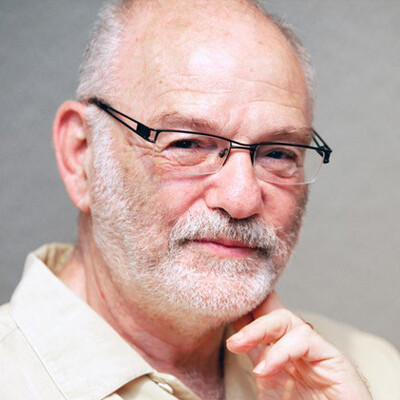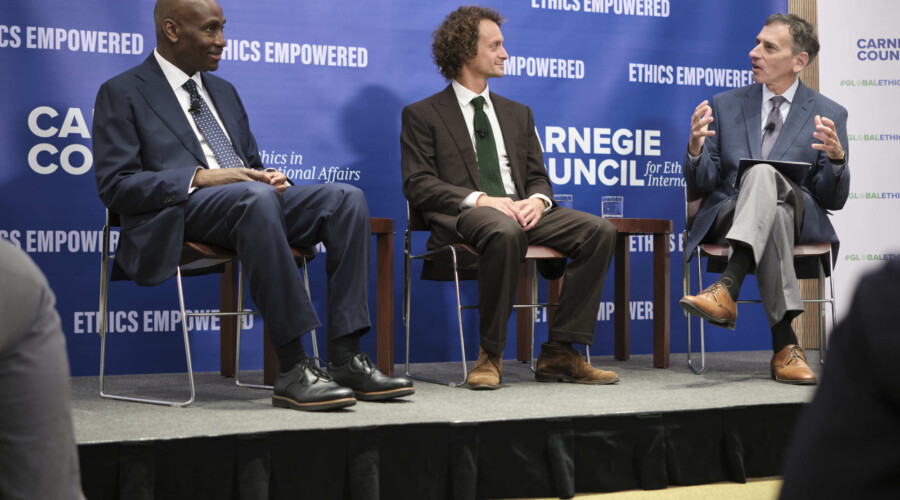Decision-making in an age of "alternative facts" and disruptive technologies.
Given the troubling state of international affairs, there is reason to be greatly concerned about how ethics is framed, co-opted, or in some instances completely ignored across public and private life.
In light of growing partisanship, flagrant violations of international law, and the deployment of transformative and sometimes harmful technologies, it is essential that we recognize ethics as a vital tool for responsible leadership and public policy.
But beyond simple recognition, it’s imperative that we take a hard look at how ethics is embedded in our decisions so that it can be effectively leveraged for good instead of appropriated as a means for selfish ends, which is too often the case today.
For some, ethics has become an exercise in binary, zero-sum thinking. For others, ethics is merely an instrument of tribal politics. In a world of "alternative facts" and deliberate ethics washing, genuine moral reasoning directed at addressing inherent tensions and tradeoffs is a frequent casualty.
Whether you vote in an election, attend university, work at a financial institution, participate in the gig economy, or hold a position in government, we all must challenge ourselves to understand a few fundamental questions in order to re-envision ethics for the rapidly changing world.
First, what tools are necessary to move an ethical agenda forward, particularly at this moment in time?
And second, what can be done to promote a genuine, good-faith effort to empower ethics as a tool for both reasoning and working through difficult challenges where values conflict and there are many uncertainties?
To start, we need to recognize that society has a "Problem with Perfect."
Ethical argument these days usually takes the form of righteous indignation and moral certainty. Everything is binary. We live in a zero-sum, winner-take-all society—ethics included. In this context, if you disagree with me, not only are you wrong but you are also a bad person.
We often overlook the most basic fact: No one is perfect. Humans are as flawed as the families and communities within which they live. Values conflict and tradeoffs are inevitable. No one has a monopoly on virtue.
In fact, good engineers understand that each feature that is maximized by nature or their design will be accompanied by inherent flaws, weaknesses, or fragilities. For example, eggs are a strong protective environment, yet fragile when struck in particular ways. Even super-strong metals lack resilience and will be brittle when stressed.
Despite a recognition of flaws within nature and daily life, we continue to function in a manner where perfection is expected. It is no coincidence then that the word "utopia," with its roots in Greek, means "no place." It does not exist. And it is also no coincidence that so much utopian literature ends in dystopia. Human society cannot be perfected.
The bankruptcy of the puritanical approach to ethics is proven by history. We see it in moral panics fueled by belief in singular truths, stoked by fear and insecurity. The pattern is familiar. An evil is identified. It must then be eradicated from society.
For Americans, historical examples come to mind such as the Salem witchcraft trials and the Red Scares—as well as xenophobia in immigration policy, which extends to the present day. In Russia today, we see fixation on a phantom Nazi menace.
One-dimensional moral assertions do more harm than good. This is why we need a re-envisioning of ethics. Not just as a tool for philosophers and academics, but as an active process that individuals can engage in to help provide direction to our lives and respectful structure to public debate.
Ethics aims toward a telos or ultimate purpose. Its main feature is an iterative process of zigs and zags, open to correction and revision. In this way, ethics is a practical tool used to make decisions rather than a static set of principles to be taken off a shelf.
While there can often be consensus around principles or values such as not killing, stealing, or lying, each principle has limits and exceptions. More importantly, few practical choices entail the achieving of just one goal. For complicated situations many values come into play, and differing values will conflict or be prioritized differently by various stakeholders. There is seldom just one course of action for addressing a complicated challenge, but often several, each with differing benefits, risks, and undesirable consequences.
An approach to ethics that confronts difficult tradeoffs and the imperative to ameliorate harms is not the dominant paradigm. But it should be.
Subscribe to the Carnegie Ethics Newsletter for the latest analysis from Joel Rosenthal
The Information Age simultaneously presents significant ethical challenges and opportunities.
Collectively, information technologies, biotechnologies, and nanotechnologies have given birth to an inflection point in human history: the Information Age. Re-envisioning ethics will be helpful for all realms of human endeavor, but it is particularly essential for addressing the challenges posed by emerging technologies that are rapidly transforming daily life and reshaping human destiny.
To make matters more difficult, there are many uncertainties about how emerging technologies will impact society. And therefore, we must consider many options or paths forward in making choices regarding near-term considerations.
The benefits, risks, and societal impacts of technologies being deployed or likely to be developed need to be evaluated. In some cases, choices must be made as to which technologies can be embraced, which should be rejected, and how to shape and/or regulate technologies capable of being used in harmful or undesirable ways.
Disagreements are already evident. Some technologies available have been utilized for inherently destructive purposes. Social media is being used to empower misinformation and lies. The collection and conglomeration of personal data can undermine privacy and empower surveillance tools and techniques to manipulate behavior for marketing or political purposes.
As technologies such as artificial intelligence increasingly shape everyday life, there is a struggle for the ethical high ground. Corporations want to be seen as virtuous—or at least not an enemy of the good. And so, we see leaders like Larry Fink, CEO of BlackRock, the largest asset management company in the world, advocating that corporations embrace social responsibility and "a sense of purpose." We also see a proliferation of private sector initiatives such as AI for Good and the Partnership for AI seeking to align corporate interests with broad societal goods. Similarly, universities are attracting major contributions to establish hubs for the study of AI and its practical applications.
But with these developments, we must ask ourselves: Do ideas follow money? Or does money follow ideas? In the case of AI ethics, the verdict is not yet in. However, one thing is clear. There are real incentives for businesses and governments to be aligned with ethics initiatives, if only to be seen as being on the right side of history.
Ethics washing is a reality in the binary world in which we live—whether by corporations, politicians, or universities. Much lip service is given to virtues such as diversity, equity, and inclusion, even as the goals and means to achieve them remain ill-defined and elusive.
It is time for a genuine re-envisioning of ethics.
A re-envisioning of ethics is certainly not a rejection of the past. Ethics will continue to be grounded in shared principles as goals to strive to fulfill. The Golden Rule or something like it exists in all traditions and offers a good starting point. The dignity and rights of each individual has become sacrosanct. What exactly those rights are and require of us and our governments remains a subject for debate and further elucidation.
The various approaches to ethics should not be reduced to algorithms for determining what is absolutely right and good. Each approach underscores differing considerations that we would like to have factored into good decision-making.
A re-envisioning of ethics should center around its function as a tool for helping make difficult decisions where values, needs, and goals conflict. Good ethics is about the application of skillful means in working through such difficult challenges towards an imperfect yet acceptable resolution. In evaluating differing courses of action, each with varying benefits, disadvantages, and weaknesses, good decision-making requires more than selecting the best option forward. Good decisions also entail addressing those detriments or harms created by the choice made.
Looking ahead, ethical reasoning requires input from a variety of perspectives and experiences as well as collaborative problem solving across disciplines and professions. An appeal to virtue will be essential, but virtue alone will not be enough.
This moment calls for an open and good-faith effort to empower ethics as a tool for better living rather than as a placebo dispensed by the powerful to justify their interests. Whether this happens is an open question.
In the meantime, beware of those preaching perfection. They may be the enemies of the good.
Joel H. Rosenthal is president of Carnegie Council for Ethics in International Affairs. Subscribe to the Carnegie Ethics Newsletter to receive future updates from Joel Rosenthal translating ethics, analyzing democracy, and examining our increasingly interconnected world.
Wendell Wallach is a Carnegie-Uehiro Fellow at Carnegie Council for Ethics in International Affairs, where he co-directs the Artificial Intelligence & Equality Initiative (AIEI).





